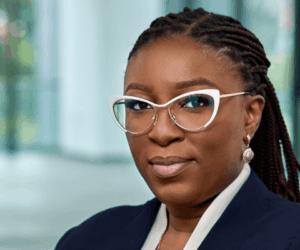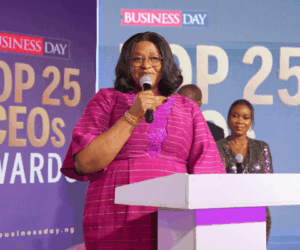1
Mr Oguche Agudah is the Chief Executive Officer, Pension Fund Operators Association of Nigeria, a pension industry body for licensed pension fund managers in Nigeria, an advocacy group working on common themes that affect the operators and the sector. In this exclusive interview with CHRIS EBONG, the CEO speaks on pension industry-wide issues including the agitation by the Nigeria Police Force to exit the CPS, among others. Excerpts:
Now, tell us about the pension industry in Nigeria in the first half of the year 2025, what is your assessment?
Yes, the industry is growing and continues to grow in terms of assets and in terms of number of people that we’re signing up to the industry.
So, we have about 10.6 million RSA holders, retirement savings account holders, and we have about N24.6trillion in pension assets as at end of June 2025. And the reason why we mention these assets is not to brag about the growth, but more importantly to show that pension assets in Nigeria are funded. It’s very important.
Before the Contributory Pension Scheme (CPS), the pension liabilities were not funded.
The Federal Government had at least N2trillion in pension liabilities that it had not paid and didn’t even know how it was going to pay.
So, with the CPS, we’ve moved from a negative of N2trillion to a positive of over N24trillion funded, meaning that anyone under the Scheme who retires today will get their payments.
We don’t need to borrow money. It is there in their accounts and they’re going to get their money. So, that is a key benefit of Contributory Pension Scheme.
Let us all look at the other product of the pension, the Personal Pension Plan (PPP), what is really wrong? Who is responsible for educating the public on this? Is it the regulator or the PFAs? What is responsible for the low penetration?
Yes, anywhere in the world, the PPP which used to be called Micro-Pension Plan is a tough sale because it’s voluntary.
Typically, we are targeting those who are at the bottom of the pyramid, who might not have enough money to save.
So, we have to use different strategies. When we launched it in Nigeria in 2019, the following year COVID hit. And because of that, many people were not saving. People were rather using their money for their personal immediate needs, whether food, shelter, and just for day living. So, people were not thinking of the future.
But, now we are out of COVID, and we are seeing people willing to save more. It’s a joint responsibility of the pension fund operators and regulators to educate, to enlighten, and that is what we are trying to do.
However, we sort of slowed down a bit because we wanted to rejig the product, as we’ve seen with the new product name, personal pension plan.
And there are going to be new features that are going to come out very shortly because we’ve tried to study that segment of the markets. And we are trying to bring out some incentives that will enable people to save. Don’t forget, it’s voluntary. So, we need to find different strategies.
Can we have an idea of the new features that are going to be embedded into it and how soon are we expecting that coming? Do you also think of bringing in the assistance of the government, in a way, to compel people to buy into this personal pension plan?
Yes, one of the things we’ve done was to look at what other markets are doing.
One of the markets that have seen a significant growth is Rwanda, where we have seen matching contributions.
Whereby, if someone saves a dollar, the government will match that contribution. So, that’s another incentive. And that’s something we’re exploring here.
But, Nigeria’s size is large, and we have fiscal constraints. Nonetheless, that is one thing that we’re looking to do, matching contributions. But there are still compositions around that.
In terms of compelling, for us, it’s not a case of compelling because the personal pension plan is voluntary.
But, we would like to see or we’re exploring ways by which it can be a strong reason for people to save.
Perhaps, you will not be eligible to one or two services if you don’t have those pension accounts. So, we’re still exploring these issues. But I think later this year, you will see some of these features coming out.
Another contentious issue is the alternative investment of pension funds. What are we looking at and of course the development in that space?
Yes, alternative investments, as the name implies, it means that it’s not a traditional investment.
So, when we look at traditional investments, whether fixed income, whether equity, whether bank deposits, those are traditional investments.
Pension fund in Nigeria will continue to invest in traditional investments. However, we realize that we need to shift a bit more into alternative investments because they offer potentially higher returns.
They give us an opportunity to diversify our assets. And they also help to increase economic activity, which will also increase the pensionable Nigerians.
So, there are benefits for us. But alternative investments are also riskier than the traditional investments. They are not as liquid. So, even though they do offer some benefits in terms of returns and diversification and economic activity, there are also some downsides. So, it’s something that we need to enter cautiously and enter with the right expertise.
And does it mean a total diversification from the equity securities or something?
No, it’s still has to be…it will be together. Currently, our investments in alternative investments are less than 2% for the entire industry.
This includes real estate, infrastructure, and private equity. For us, it’s to at least, double that number.
So, we just want to increase the quantum percentage of our investments in alternative investments.
Of course, we will not leave the traditional but at least let’s ramp up the numbers. They exist side by side.
We cannot leave the traditional equities, fixed income, and government bonds. We will not leave that, but we need to increase allocation to others…
Talking about government bonds, government securities in general, do you think of reducing the percentage of investment in that segment of the economy?
Yes, well, again, there’s a maximum limit for investing in government bonds and again, investing in other asset classes based on PenCom’s investment guidance. There’s a maximum limit.
So, each PFA can decide to hit the maximum. Some are at the maximum while some are not. So, it’s each PFA’s prerogative on how they want to play in that space.
But PenCom has given a maximum limit and a PFA can decide to either hit the maximum or play below. I think we’ll leave that to individual PFA’s to see how they can.
And can you give us an update on the mortgage for RSA holders?
Yes, as of the end of Q1 2025, I think, the industry had disbursed about N150 billion or close to that to 25,000 individuals who had applied.
At what rate?
For us as pension fund managers, what we do is we just ensure that the documents are correct and then we disburse 25% of their RSA to the mortgage, the primary mortgage institution. With regards to interest rates, that is negotiated between the RSA holder and the primary mortgage institution. We don’t get involved in that.
The issue of accrued pension rights, as we speak, has not been corrected, according to reports, over N280 billion is still pending. So, what are the practical steps taken by PenOp to ensure that this money is being released by the FG?
Yeah, as you know, we work in concert with the regulator and the regulator has been doing a fantastic job in engaging the Federal Government, which culminated in the recent approval by the Federal Executive Council, the Senate and the House of Representatives, N750billion bonds, which should clear out all these accrued rights. So, that has been approved.
So, the process to issue that bond is ongoing and once that happens, it will clear all the accrued rights. This is landmark for the pension industry.
This is the first time any government has actually in one fell swoop wiped away not just the accrued rights, but also the pensions that have to do with salary increases.
Also, the government’s commitment to minimum pension guarantee and also to ensure the salary for life scheme for professors is being able to actualize. So, N750 billion will take care of all of that.
So, once that happens, these accrued rights will be a thing of the past. And then it will be a case of on a monthly basis releasing that as it comes.
The Nigerian Police wants to exit the CPS. What do they want? What are their demands? Why is it difficult for the CPS, the pension operators under CPS to address this issue once and for all for them?
What they are asking for is that their pensions are low. And I think that even brings to fore the benefits of the CPS.
20 years ago, the challenge was they had to queue to get their pensions. Their pensions were not coming on time or their pensions were being stolen. But now that’s a thing of the past.
So, they get their pensions every month, without fail. What they’re protesting is that it’s low and low is relative. I would say because of the inflationary trend over the last two years, that’s why the money they’ve gotten is not able to take them far.
But, what needs to happen, as I’ve said countless of times, pensions is a function of your salary. We do not see CBN staff, CBN retirees, protesting. We do not see NDIC retirees and others protesting. All of these are under the CPS.
Why? It’s the same thing with police. The issue is the salaries of the police and the promotion system, you see a constable who’s on one level and for 35 years he’s on that same level. His salary is not being increased or it’s increased marginally.








